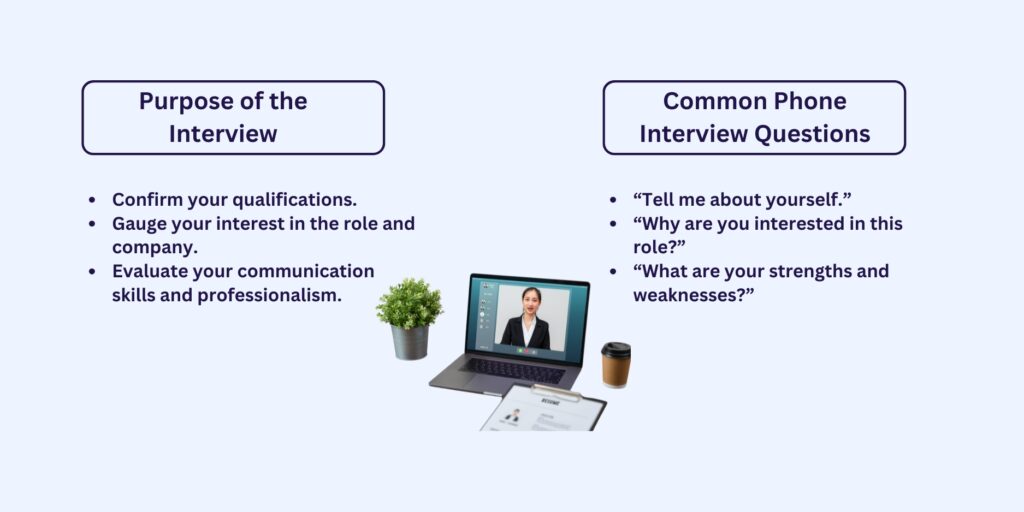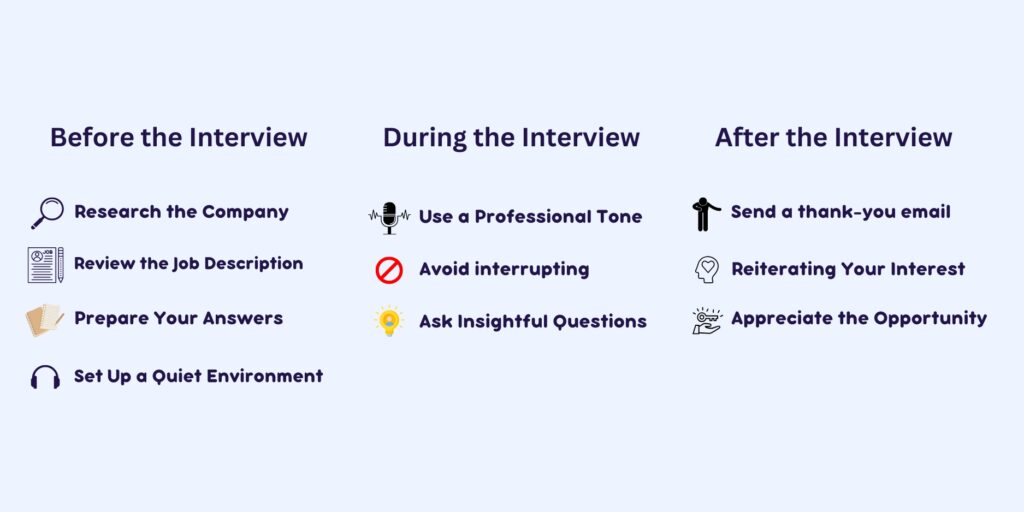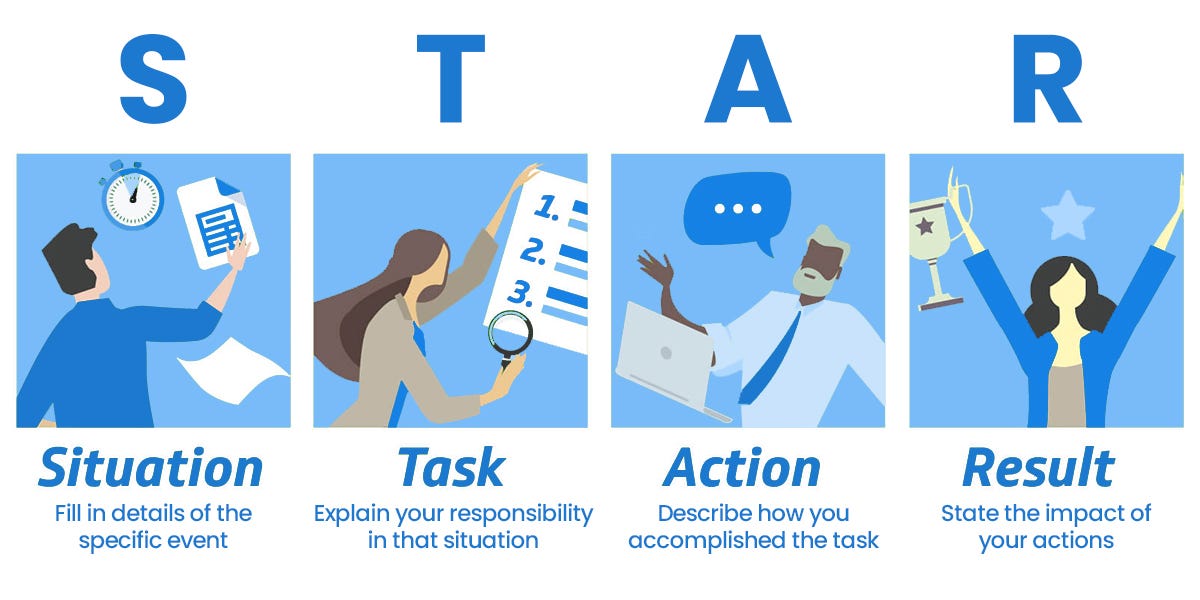How to Prepare for a Phone Interview: Best Tips for Acing it
Knowing how to prepare for a phone interview is essential, as it’s typically the first screening step companies use to decide if you’re a good fit. During this “getting to know you” call, recruiters confirm whether your skills align with the role and assess your communication style.

Image Source: Pexels
This guide sets out to cover all the essential components of preparing for and going through the entire interview process-presenting yourself in a positive light, answering difficult questions, and much more. Whether you are applying internship, assuming a position in a highly competitive organization such as Amazon or Google or simply freshening up interview techniques.
What is a Phone Work Interview?
A phone work interview is an introductory process in recruiting to screen applicants and employers in a more convenient arrangement. This call facilitates the hiring team to consider the prospect’s work background, credentials, voids of the individual, and level of desire to join the company, even before physical or other deeper interviews are done. Such a call breaks the ice and helps both sides figure out the possibility of a fit without wasting too much time.
What to Expect in a Phone Interview?

Phone screen interviews are the first step in any recruitment process, and they usually last 20-30 minutes. They assess your credibility, qualifications, passion for the role and company, communication skills, and professional behavior.
How Do Phone Interviews Work?
Typically, a phone interview is for a time and shorter duration than usual, and its goal is to verify that the candidate’s experience and capabilities are consistent with the requirements of the job. The following is a rundown on what companies and their designated employees are bound to do for telephone interviews to be quality assured:
- Introduction: The interviewer introduces themselves and explains the nature and cause of the hiring process.
- Questioning: Expect questions about your background, qualifications, and motivation for applying. Typical questions might include “Tell me about yourself” or “Why are you interested in this role?”
- Your Turn to Ask: You will be able to ask the manager what you want answers to concerning the job, organization, and interview preparation.
- Next Steps: Potentially, the interviewer would comment about what will happen after the interview while still on seamless term termination with the candidate before hanging up the phone.
If you keep in mind this system arrangement, you will be very likely of better results in terms of feeling more qualified for the role and better self-assured when faced with potential sources of stress across the interviewing process.
Preparing for a phone job interview
Preparing for a telephone interview includes some basic steps which are as follows:
Create a Perfect Phone Interview Environment
- Choose a distraction-free space and have a professional setup
- Keep your technology checked before the actual phone interview
- Have important documents and notes nearby
Keep a Note of the Skills Mentioned in the Job Description
Analysis of the job description can help you understand the recruiter’s expectations of you as a job candidate and prepare the best responses for telephone interview questions. For Example, assume the job post contains such qualities as ‘management of a project’ as well as ‘working with others.’ You may include instances in which you were able to complete a particular task mentorship or worked in another culturally diverse team. Should the job state that you are required to have knowledge of certain software, Salesforce or Excel for instance, expect to elaborate on your practical knowledge of such tools and the results achieved in them.
Focusing and preparing your answers to the critical competencies indicated in the job description is not only a clear proof of your attentiveness towards the job advertisement but also an illustration of your capacity to perform in the role. this kind of preparation will improve and enhance the content of your answers during the phone interview, which could lead to a positive outcome in the recruitment process.
Research the Company and the Job Role
Knowing the company’s mission and values can help you convey your interest to the recruiter during a call interview and formulate your answers aligning with the company’s goal and vision. Understand the job description and find out how your skills align with the present job role and key responsibilities so that you can prepare better and relevant responses.
Know Your Interviewer
Find your interviewer on LinkedIn and get a sense of his/her background to get commonalities and a more personalized conversation. Knowing their role and interests can help you crack the interview code.
Prepare Common Phone Interview Questions
Create a list of frequently asked phone screen questions and prepare the best answers to those in advance. Here are some frequently asked phone interview questions:
- Tell me about yourself.
- What motivates you to apply for this job?
- Are you able to highlight the important points on your CV?
- In your opinion, what are your strongest and weakest points?
- Describe an instance when you encountered a challenge in the workplace and how you tackled it.
- What is the reason for quitting your present position (or what is the reason for leaving your last job)?
- Could you please specify the salary bracket that you are looking for?
Answering these telephone interview questions can significantly boost your chances of passing the phone interview.
The Ultimate Phone Interview Cheat Sheet

Phone Job Interview Tips: How to Ace a Telephone Interview
Learning how to ace a phone job interview is key to making a great first impression and moving forward in the hiring process. Phone interviews are often the initial screening step companies use to identify top candidates. With the right preparation and strategies, you can confidently showcase your skills, highlight your interest in the role, and set yourself up for success in the next stages.
Answer the Call Professionally
You should always have a polite start by saying “Hello, this is [Your Name],” to sound professional. Make sure to be present in a noise-free environment to avoid any discontinuity in hearing the noise.
Speak Confidently with Pace
You should not rush, listen to the recruiter carefully, and take your time while answering to keep your sound confident. And use expressions as well to increase engagement.
Get a Cheat Sheet Ready
Well, its name suggests that it’s something related to cheating during a telephonic interview but it is not cheating at all. All you need to do is keep your resume, notes on the company, and bullet points about your achievements nearby so that you do not feel stressed during the interview and you do not need to read answers directly from your cheat sheet because it would seem reading a script rather it will serve as a helping hand in case you forgot something.
Dress Professionally
You might be thinking about how dressing matters in a telephone interview, and to some extent you are correct, it’s not for impressing the recruiter but to boost your confidence and give you a real interview environment.
Thank the Interviewer
You should always end your interview on a positive note by thanking the interviewer for providing the opportunity and their time.
Cracking Common Phone Interview Questions
Start Strong
While answering the phone interview questions, you should always showcase your experience and skills that align with the job description and provide specific examples. Explain why you are the best fit for the job and how your career goals match the company’s mission.
Use the STAR Method for Behavioral Questions
The STAR method is best for answering behavioral interview questions like “Tell me about a time when…” or “Describe a situation where…. and STAR stands for Situation, Task, Action, and Result. It helps you create a structured answer to the recruiter’s question and show the impact of your work.

Common Phone Job Interview Questions and Answers
Here are a few questions you’re likely to encounter in a phone interview, along with example answers to help you prepare:
Tell me about yourself
Answer: “I have worked in [whether the industry or any other working environment for how long] industry for more than five years. I have built up some good skills especially in [mention some skillset that would be ideal for the job at hand]. On a personal level, the job requirement matches the most appreciated part of me. I am looking forward to using my know-how at [Company Name].”
Why are you interested in this role?
Answer: “This position attracts me because I can employ the skills I have and work in a place where [notable characteristic of the company such as science or T&E] lies come to [the employee seeking to join them].”
What are your strengths?
Answer: “I possess good skills regarding arts and administration”. For instance, I successfully solved a problem that I faced in my past job and achieved the best of its results.”
What are your weaknesses?
Answer: “On occasion, I respond to as many tasks as possible which becomes quite chaotic. Nonetheless, I am improving in this by providing solutions as well as setting objectives in order to unwarranted and exceptional performance.”
Do you have any questions for us?
Answer: “Yes, can I know who are the other members of this department and how I fit in there?” or “How is this role lined up for me in the initial days of the project’s inception?”
These answers can help guide your responses and show that you’re prepared, professional, and genuinely interested in the position.
Questions to Ask During a Phone Interview with the Interviewer
Ask Questions That Show Your Interest in the Role
Asking questions that relate to the job role and the recruiter’s requirements can show your genuine interest and passion for the job. These questions will help you assess whether the job role aligns with your career goal or not.
Sample Questions to Ask:
- Please provide details on how you will define and measure success for this role
- Would you be able to elaborate on the team I would be placed in?
- What mechanisms does the company have in place to foster professional progression and training?
Avoid questions that focus solely on salary, benefits, or vacation time at this stage.
Following Up After the Phone Interview
Send A Follow-Up Email
Thank-You Letter
It is appropriate to send a short follow-up email to the interviewer after about a day – usually to thank them for their efforts. Remind the interviewer how interesting the position is and point out some details from the interview so that they will know you were actively listening.
A Sample Follow-Up Email
“Thank you for taking the time to talk with me today regarding the position of [Job Title]. I was pleased to know more about [Company] and I am looking forward to joining your team. Hope to work together soon!”
Related: How to Write a Thank You Letter After Interview (With Awesome Samples 2024)
Review Your Performance
After the phone interview, you should always evaluate yourself, look for improvements for future interviews, and refine your approach.
Conclusion
The ability to prepare for a telephone interview includes artistic direction, self-assuredness, and interest in the position at hand. By concentrating on the fundamentals such as company research, honing out answers, creating a conducive environment, and upholding a business-like manner, you can leave a mark. Consider utilizing the STAR method for the behavioral questions that you will be faced with. Do not however forget to ask questions that you find crucial regarding the job, it will show how you value the opportunity. Warms up the conversation with a great concluding remark, massages the ego by saying thank you, and remembers to also send a thanking letter after the call portraying your class and excitement.
In light of that, it appears that you are more than ready to take on any phone interview without breaking a sweat. Continue perfecting your methods and use each experience as a chance for growth and advancement. Pretty soon, you will be navigating through the hurdles with ease and proceeding to the next phase! All the best!




